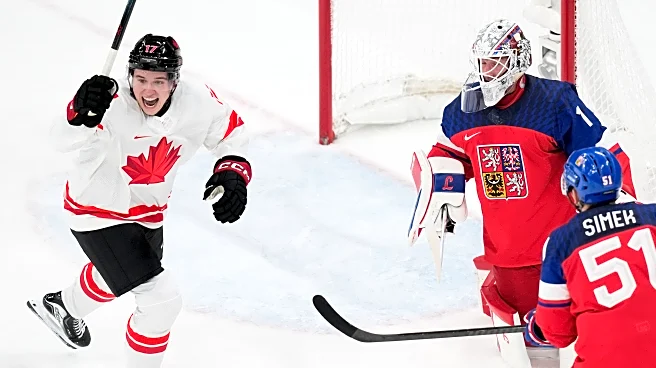What's Happening?
Brady Skjei, a defenseman for the Nashville Predators, contributed an assist during the team's 7-4 defeat against the Toronto Maple Leafs. This marks Skjei's first point in the current season, having played
four games so far. In addition to the assist, Skjei registered three shots on goal and blocked two shots during the game. He is currently positioned on the second defensive pairing, benefiting from Roman Josi's return to the top pairing. Skjei's performance includes eight shots on net, six blocks, three hits, and a plus-2 rating, with an average ice time of 22:56 per game. Despite his supporting role, Skjei is considered a reliable 30-point blueliner, although his fantasy profile lacks standout features.
Why It's Important?
Brady Skjei's performance is significant for the Nashville Predators as they navigate the early stages of the NHL season. His ability to contribute defensively and offensively is crucial for the team's overall strategy, especially with Roman Josi leading the top pairing. Skjei's consistent ice time and defensive capabilities provide stability to the Predators' lineup. For fantasy hockey enthusiasts, Skjei offers a dependable option, though his lack of standout characteristics may limit his appeal to those seeking high-impact players. His role as a 30-point blueliner ensures a safe floor for fantasy managers looking for steady contributions.
What's Next?
As the NHL season progresses, Brady Skjei is expected to continue his role on the second defensive pairing, providing support to the Predators' defensive strategy. His performance will be closely monitored by both the team and fantasy hockey managers, who will look for improvements in his offensive contributions. The Predators will aim to leverage Skjei's defensive skills to enhance their overall performance and secure more victories. Upcoming games will test Skjei's ability to maintain his current level of play and potentially increase his point production.
Beyond the Headlines
Brady Skjei's role in the Predators' lineup highlights the importance of depth in a team's defensive strategy. His ability to perform consistently, despite not being a standout player, underscores the value of reliable contributors in professional sports. This dynamic reflects broader trends in team management, where balancing star power with dependable support players is crucial for sustained success. Skjei's performance may also influence discussions on player development and the cultivation of versatile athletes capable of adapting to various roles within a team.










